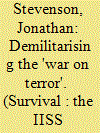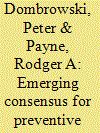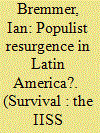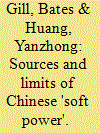|
|
|
Sort Order |
|
|
|
Items / Page
|
|
|
|
|
|
|
| Srl | Item |
| 1 |
ID:
073056


|
|
|
|
|
| Publication |
2006.
|
| Summary/Abstract |
Chechen-style turmoil is spreading across the rest of the North Caucasus, and the Kremlin seems incapable of coping with the mounting chaos, or even understanding its causes - among them poverty, unemployment, ethnic tensions, corrupt pro-Moscow elites and high-handed policies by local authorities. Islam has become an increasingly powerful political force, and some Islamist groups are unquestionably radical and violent, and seek a sharia-based Caliphate uniting the North Caucasus. Their tactics include assassinations, kidnappings, bombings and armed attacks against towns. But there is a bigger issue at stake. Russia has many millions of Muslims, and xenophobic, anti-Muslim organisations and sentiment are increasingly prominent in the Russian political landscape. The spread of the North Caucasus crisis to other Muslim regions, such as Bashkortostan and Tatarstan, could affect Russia's entire political trajectory.
|
|
|
|
|
|
|
|
|
|
|
|
|
|
|
|
| 2 |
ID:
073052


|
|
|
|
|
| Publication |
2006.
|
| Summary/Abstract |
The elimination of Afghanistan as al-Qaeda's physical base in 2001 hastened the dispersal of global jihadists into cities. In turn, the advent of Iraq as a field of jihad has prompted jihadists to refine and spread urban warfare techniques. If they choose to apply these techniques robustly to infiltrated cities elsewhere, the extraordinary need for special-operations forces - superseding the Western taboo on using a nation's military forces against its own citizens within its own territory - could arise. The US Department of Defense appears inclined to believe that the application of military power - albeit unconventional military power - will ultimately dictate victory. Such an attitude could lead to the downplaying of paramount non-military aspects of counter-terrorism, to the detriment of national and international security. If the US State Department were armed with a mandate to coordinate national counter-terrorism efforts, diplomatic, political, law-enforcement and intelligence efforts against terrorism would gain momentum and coherence.
|
|
|
|
|
|
|
|
|
|
|
|
|
|
|
|
| 3 |
ID:
073057


|
|
|
|
|
| Publication |
2006.
|
| Summary/Abstract |
After u September 2001, the George W. Bush administration declared that the United States had adopted a 'pre-emptive' military doctrine to address new threats posed by terrorists and 'rogue states' armed with nuclear, biological or chemical weapons. However, the so-called 'Bush Doctrine' met substantial international opposition when it was proposed - and even more resistance when it was applied to the case of Iraq. Subsequent events in Iraq have not made the idea any more popular. It is somewhat startling, then, that numerous states and international organisations seem now to support the call to revise long-held international understandings about when force might be used. A sizable number agree that the risk of calamitous surprise attacks, especially with nuclear, biological or chemical weapons, might justify preventive strikes or wars against terrorists or their state sponsors. Anew international norm may thus be under construction, though states continue to disagree about the agents of decision and action.
|
|
|
|
|
|
|
|
|
|
|
|
|
|
|
|
| 4 |
ID:
073054


|
|
|
|
|
| Publication |
2006.
|
| Summary/Abstract |
Various conditions have facilitated Europe's rise as a 'hub' of global jihad, especially the presence of a nucleus of foreign Islamist activists, a large pool of potential recruits, and the freedom to operate with few, if any, restrictions. The Iraq war has prompted a revival of the jihadist network in Europe. In response, European policymakers need legal reforms, increased institutional cooperation and sustained efforts to engage with European Muslim communities. The threat is both urgent and profound, and it will be necessary to embark on considered long-term strategies which may require European leaders to re-examine some of the tacit arrangements that have allowed European societies to enjoy an unparalleled degree of domestic freedom, peace and prosperity.
|
|
|
|
|
|
|
|
|
|
|
|
|
|
|
|
| 5 |
ID:
073053


|
|
|
|
|
| Publication |
2006.
|
| Summary/Abstract |
Since the early 1990s, the maximum violence in acts of international terrorism has steadily increased. It is on the basis of this trajectory - and because of al-Qaeda's stated aims to acquire and use a so-called 'weapon of mass destruction' - that many analysts have concluded that a nuclear terror attack is likely only a matter of time. Others argue that this is alarmism, but the fissile material is available, or could become available, from a Russian nuclear stockpile that remains dangerously insecure. An improvised nuclear device would be difficult, but not too difficult, to build. And there are terrorist groups that have already demonstrated the technical abilities and organisational reach to make us very worried.
|
|
|
|
|
|
|
|
|
|
|
|
|
|
|
|
| 6 |
ID:
073050


|
|
|
|
|
| Publication |
2006.
|
| Summary/Abstract |
Latin American voters will soon cast ballots in national elections in several countries. Some argue that the region is undergoing a uniform political shift to the left, that mistrust of neo-liberal economics and US foreign policy has united these states in a populist wave of reaction against both, and that this trend will bind these states to countries outside the region, undermining US interests. This generalisation does not withstand country-specific scrutiny. Analysis of the unique political circumstances in each of these states reveals that the populist, anti-American trend is hardly uniform, and that the political and economic ties that bind Latin America and the United States are not so easily undone.
|
|
|
|
|
|
|
|
|
|
|
|
|
|
|
|
| 7 |
ID:
073051


|
|
|
|
|
| Publication |
2006.
|
| Summary/Abstract |
In current analysis and debate concerning China's rise, the subject of soft power is either missing or misapplied. Since the 1990s, China has achieved impressive gains both in terms of soft power resources and the ability to convert the resources into desired foreign-policy outcomes. Unlike the former Soviet Union, China appears to be more successful in developing hard and soft power in tandem. Its steppedup endeavours in expanding its soft power nevertheless continue to be constrained by three factors: imbalance in resources, legitimacy concerns regarding its diplomacy, and a lack of coherent agenda. How Washington and its allies respond to this unique power pattern will shape the future strategic landscape of East Asia and beyond.
|
|
|
|
|
|
|
|
|
|
|
|
|
|
|
|
| 8 |
ID:
073055


|
|
|
|
|
| Publication |
2006.
|
| Summary/Abstract |
The missile issue is back, yet the problem has not yet generated the broader public debate necessary to understand what missile proliferation really means for Europe and what instruments should be chosen to deal with it. For Europe, the most important ramification of this proliferation will be to restrain European willingness to intervene militarily beyond the territories of NATO and EU members. With this background, the debate on missile defence is likely to continue on Europe, yet with only a moderate threat perception, tight budgets and other military necessities, missile defences can not be a political priority.
|
|
|
|
|
|
|
|
|
|
|
|
|
|
|
|
|
|
|
|
|